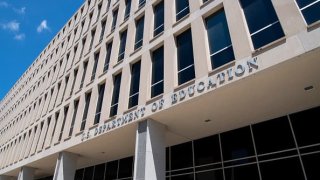
- These institutions owe money to the department as of February, according to the National Student Legal Defense Network's report.
- "There is nothing happening to collect debt from institutions, owners and executives of for-profit colleges. That sort of disparity in the way the department treats them is grossly unequal," one of the report's authors told CNBC.
The Department of Education has failed to collect more than $1 billion in debt from nearly 1,300 colleges, most of which are for-profit, according to a report released Thursday by a nonprofit student advocacy group.
These institutions owe money to the department as of February, according to the National Student Legal Defense Network's report, which cites documents obtained over the past two years through Freedom of Information Act requests.
The group claims the department has failed to apply the same aggressive methods typically used to collect money from student loan borrowers to collect debt owed by colleges and their owners.
"The department continues to spend a lot of time, energy and money on its collection systems from student borrowers," Dan Zibel, the nonprofit's chief counsel and one of the report's authors, told CNBC. "Yet there is nothing happening to collect debt from institutions, owners and executives of for-profit colleges. That sort of disparity in the way the department treats them is grossly unequal."
In a statement to CNBC, Department of Education press secretary Kelly Leon said the department is "committed to improving our policies and practices to better hold colleges accountable for their actions and to provide borrowers with fair and streamlined access to the benefits to which they are entitled."
Get Tri-state area news delivered to your inbox. Sign up for NBC New York's News Headlines newsletter.
There are many reasons why the schools owe money to the department, Zibel said. One of those is the improper distribution of student-loan funds Title IV of the Higher Education Act, a student aid program designed to lessen the financial strain of attending higher education.
Money Report
The department each year provides more than $115 billion in funding to colleges participating in the program. Those funds then gets distributed to eligible student borrowers who must repay the department directly, the report states. If a college improperly administers the funds to ineligible students or overdraws funds, it must repay the department for wasted costs, according to the report.
The report added that other reasons why colleges owe money include unfulfilled misconduct fines and discharge loans, which are student loans that institutions can become responsible for paying if they close down.
One tactic the department uses to hold colleges accountable for their debt is to cut them off from federal funding, according to the report. However, the report said that nearly 200 of the nearly 1,300 schools continued to receive Title IV funding during the 2019-2020 academic year.
"We hope that the department will do everything in its power to protect students and borrowers, and that means holding bad actors to account and rethinking how it treats struggling student loan borrowers," Zibel said.






